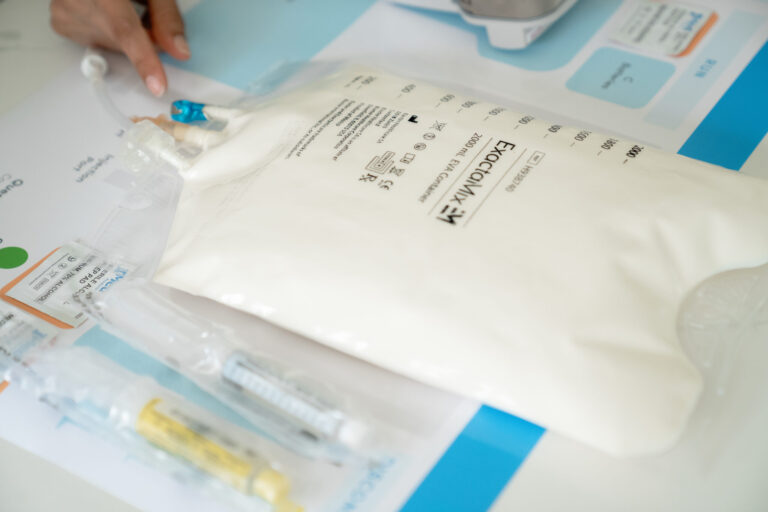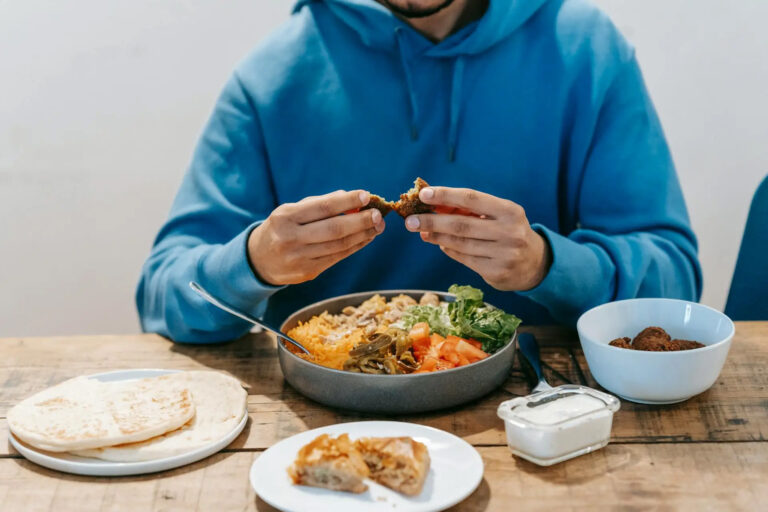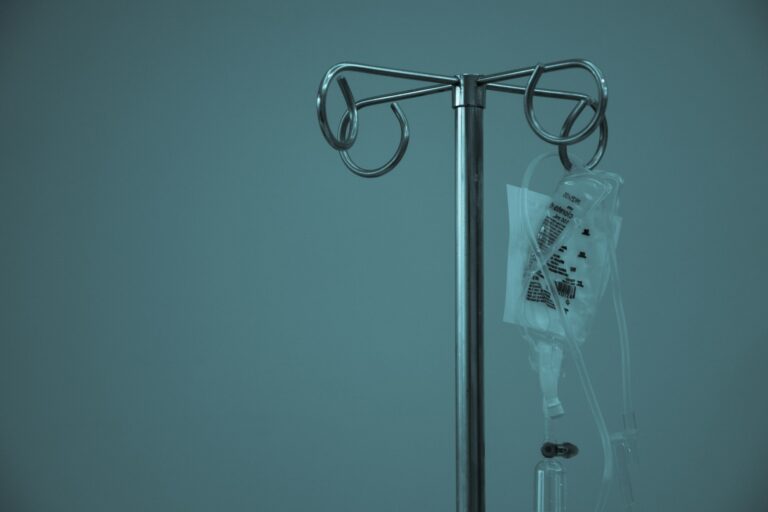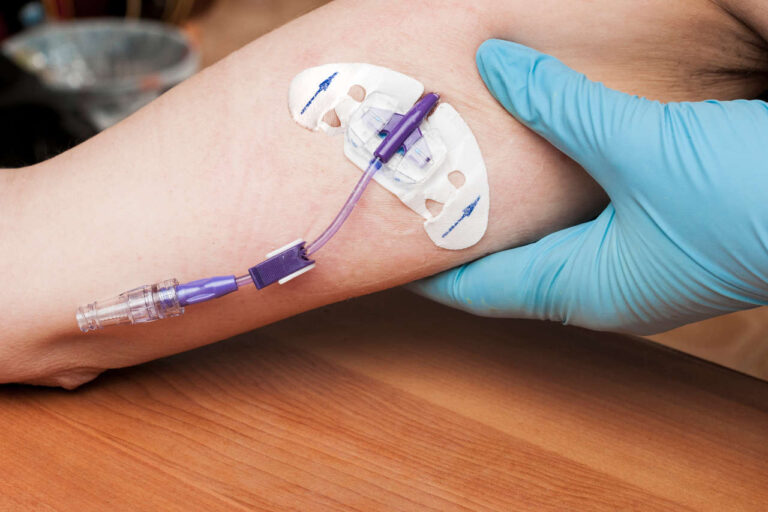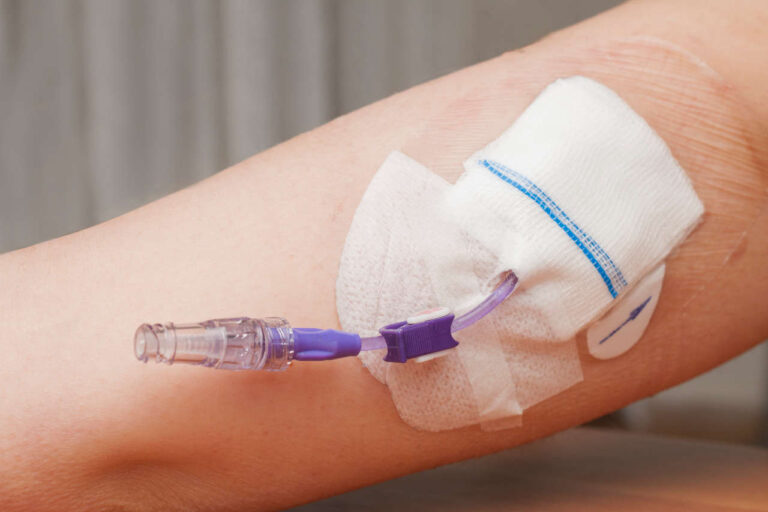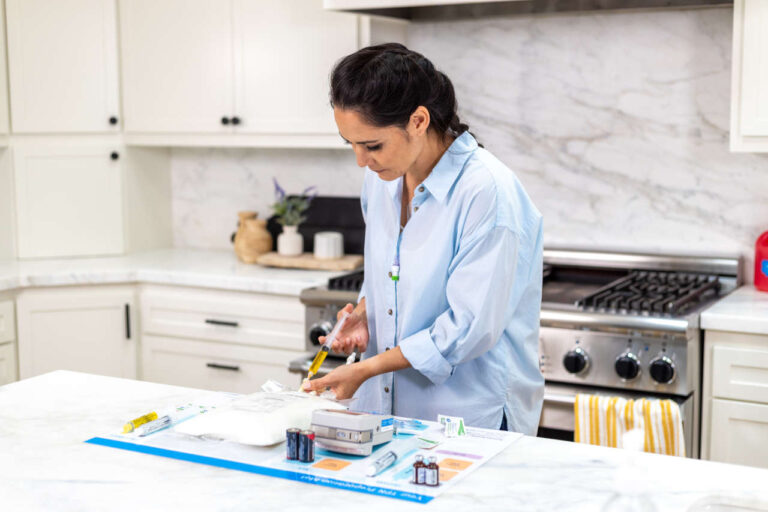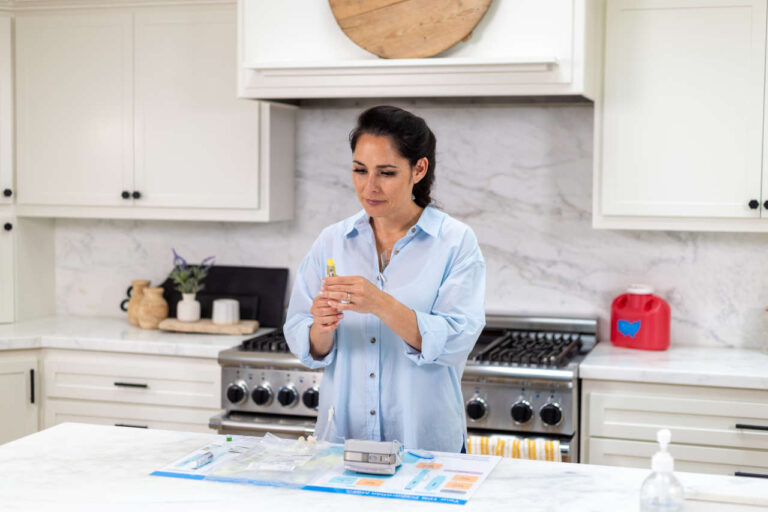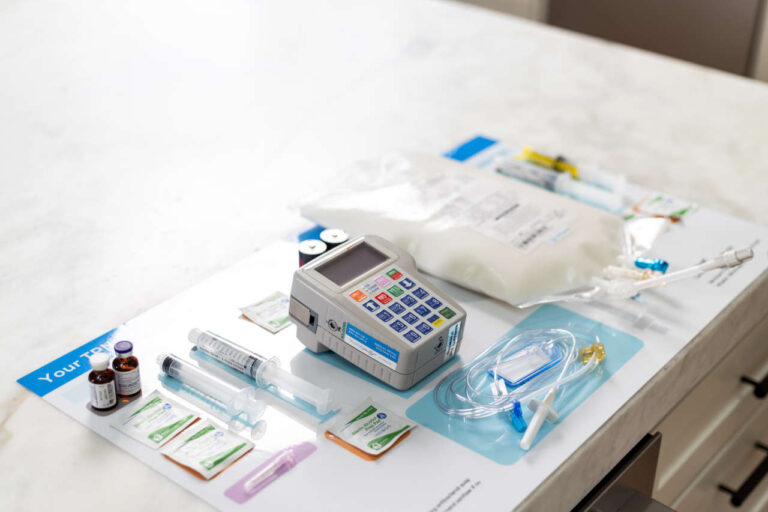
Dinh dưỡng qua đường tĩnh mạch hoàn toàn (TPN) có thể cứu sống những người không thể hoặc không nên sử dụng hệ tiêu hóa để ăn uống. Đáng tiếc là, việc sử dụng TPN lâu dài được biết là có thể gây ra một biến chứng nghiêm trọng gọi là ứ mật do TPN gây ra.
Luôn luôn có sẵn
Kho đầy đủ các loại dịch truyền tĩnh mạch, sẵn sàng phục vụ bạnTên gọi khác của tình trạng này là:
- Ứ mật liên quan đến dinh dưỡng (PNAC)
- Bệnh gan liên quan đến suy ruột (IFALD)
- Bệnh gan liên quan đến dinh dưỡng qua đường tiêm truyền (PNALD)
Trong bài viết này, bạn sẽ tìm thấy câu trả lời dựa trên bằng chứng cho những câu hỏi phổ biến nhất về tình trạng này.
1. Bệnh ứ mật do TPN gây ra là gì?
Ứ mật do TPN gây ra là một biến chứng đã được xác định rõ ràng khi sử dụng TPN lâu dài. Tình trạng này thường xảy ra trong vòng 1 đến 4 tuần sau khi bắt đầu sử dụng TPN.
Ứ mật là tình trạng dòng chảy của mật chậm lại do gan sản xuất ít mật hơn hoặc các ống dẫn mật bị tắc nghẽn.
Ứ mật do TPN gây ra là một tình trạng bệnh lý đặc trưng bởi nồng độ bilirubin (sắc tố vàng) và men gan tăng cao. Nồng độ bilirubin trong máu cao có thể dẫn đến vàng da, gây vàng da và vàng mắt.
Một đánh giá năm 2016 trong Phòng khám bệnh gan báo cáo rằng bệnh vàng da hiếm gặp ở người lớn nhưng xảy ra ở 50% trẻ em trong quá trình điều trị bằng TPN. [1]
2. Nó phổ biến như thế nào?
Trẻ em có nhiều khả năng mắc bệnh này hơn người lớn. Theo một nghiên cứu năm 2022 trên tạp chí Cureus, 18% đến 67% ở trẻ sơ sinh dùng TPN trong hơn 14 ngày có nguy cơ bị tổn thương gan và ứ mật. [2]
Tương tự như vậy, trong các cơ sở chăm sóc cấp tính, hơn 30% người lớn dùng liệu pháp TPN bị ứ mật. [3]
3. TPN gây ra bệnh ứ mật như thế nào?
Tình trạng ứ mật của TPN có thể xảy ra do nhiều yếu tố. [1,4,5,6] Bao gồm:
Yếu tố bệnh nhân
Không giống như người lớn, trẻ sơ sinh Tuần hoàn ruột gan chưa trưởng thành, dẫn đến suy giảm khả năng giải phóng và hấp thu mật. Hiện tượng này có thể giải thích tại sao tình trạng này phổ biến hơn ở trẻ sinh non.
Vai trò của chất dinh dưỡng
Lượng calo dư thừa: Bệnh nhân dùng TPN thường nạp quá nhiều calo, khiến tuyến tụy phải sản xuất nhiều insulin hơn bình thường. Thêm vào đó, nhiều bệnh nhân bị chấn thương và thường bị kháng insulin.
Hậu quả tích lũy là những người này có nồng độ insulin cao, khiến chất béo (lipid) tích tụ trong gan. Hậu quả là phản ứng viêm bắt đầu trong các tế bào gan, có thể dẫn đến sẹo (xơ gan).
Truyền dịch lipid quá mức: Tác dụng chính xác của việc truyền quá nhiều lipid vẫn chưa rõ ràng. Tuy nhiên, ứ mật được cho là do sự tích tụ lipid dư thừa trong tế bào gan.
Axit amin: Glycine dư thừa và thiếu hụt các axit amin chứa lưu huỳnh trong Công thức TPN có thể dẫn đến sự hình thành các sản phẩm axit mật không hòa tan, có thể thúc đẩy tình trạng ứ mật.
Sự phát triển quá mức của vi khuẩn và nội độc tố
Sự phát triển quá mức của vi khuẩn và nội độc tố trong ruột có thể thúc đẩy tình trạng ứ mật ở một số bệnh nhân.
Các yếu tố tiềm năng khác
Các nhà nghiên cứu đang tìm hiểu vai trò tiềm ẩn của hệ vi sinh vật đường ruột (tập hợp các vi khuẩn trong ruột) trong tình trạng ứ mật liên quan đến TPN.
Hỏi về máy truyền dịch tại nhà TPN
4. Các yếu tố rủi ro là gì?
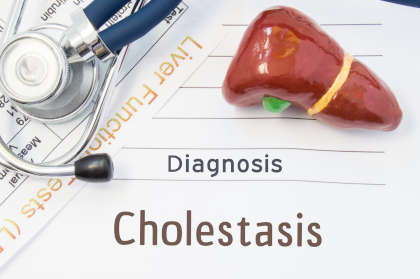
Ở trẻ sinh non, hai yếu tố dự báo mạnh nhất về tình trạng ứ mật là cân nặng khi sinh thấp và thời gian điều trị bằng TPN. [7]
Theo một nhóm các nhà nghiên cứu Hoa Kỳ, nguy cơ ứ mật cao nhất ở trẻ sơ sinh có cân nặng khi sinh dưới 500 g. Ngoài ra, họ báo cáo rằng thời gian điều trị bằng TPN càng dài thì tỷ lệ mắc bệnh càng cao. [8]
Ở người lớn, các yếu tố nguy cơ phổ biến nhất [3] là:
- Suy dinh dưỡng nghiêm trọng
- Sự nhiễm trùng
- Lượng carbohydrate và chất béo nạp vào cao
5. Những biến chứng là gì?
Sự lắng đọng lipid dư thừa trong tế bào gan và các phản ứng viêm có thể dẫn đến các biến chứng như xơ gan và xơ gan. Các biến chứng này rất có thể xảy ra nếu tình trạng ứ mật kéo dài, đặc biệt là ở trẻ em sử dụng TPN.
Xơ hóa
Xơ hóa - giai đoạn đầu của sẹo gan - xảy ra khi các mô sẹo thay thế các tế bào gan khỏe mạnh. Kết quả là gan không thể hoạt động bình thường.
Các trường hợp nhẹ đến trung bình thường không có triệu chứng, trong khi một số người có thể phàn nàn về:
- Mất cảm giác thèm ăn
- Chân hoặc bụng bị sưng
- Vàng da
- Buồn nôn
- Giảm cân không rõ nguyên nhân
- Điểm yếu
Đôi khi tình trạng xơ hóa có thể hồi phục nếu được điều trị thích hợp.
Xơ gan
Xơ gan là một dạng xơ hóa nghiêm trọng thường không thể phục hồi. Giai đoạn đầu thường không có triệu chứng. Tuy nhiên, khi bệnh tiến triển, bạn có thể gặp phải:
- Mất cảm giác thèm ăn
- Buồn nôn
- Đau bụng trên bên phải
- Có thể nhìn thấy các mạch máu giống như mạng nhện
Thay đổi chế độ ăn uống và lối sống, cùng với các loại thuốc cụ thể, có thể giúp làm chậm quá trình tiến triển. Tuy nhiên, phẫu thuật có thể là cần thiết nếu bạn không đáp ứng với điều trị hoặc bị suy gan.
Suy gan mãn tính có thể xảy ra ở 3% đến 15% trẻ em bị ảnh hưởng. [8]
Chăm sóc đặc biệt AmeriPharma®
Dinh dưỡng qua đường tĩnh mạch toàn phần | Dẫn đầu trong hỗ trợ TPN6. Chẩn đoán bệnh ứ mật do TPN gây ra như thế nào?
Bác sĩ sẽ bắt đầu bằng việc xem xét tiền sử bệnh và khám sức khỏe. Ngoài ra, họ có thể sẽ hỏi xem gần đây bạn có dùng bất kỳ loại thực phẩm chức năng thảo dược nào không. Lưu ý rằng những loại thực phẩm chức năng này, vốn không được FDA Hoa Kỳ quản lý, có thể chứa các hóa chất độc hại cho gan.
Sau đó, bác sĩ sẽ chỉ định siêu âm gan và hệ thống mật để kiểm tra xem bạn có bị tắc nghẽn đường mật hay không. Đôi khi, bạn có thể cần một xét nghiệm hình ảnh tiên tiến khác gọi là chụp cộng hưởng từ mật tụy (MRCP).
Bác sĩ sẽ xét nghiệm mẫu máu của bạn để xác định men gan, bilirubin và sự hiện diện của virus viêm gan. Các xét nghiệm khác có thể bao gồm:
- Chụp CT bụng
- Nghiên cứu Bari
Nếu chẩn đoán vẫn chưa rõ ràng, bạn có thể phải sinh thiết gan. Sinh thiết gan là phương pháp kiểm tra các tế bào gan dưới kính hiển vi để tìm kiếm dấu hiệu tổn thương hoặc bệnh lý gan.
7. Phương pháp điều trị bệnh ứ mật do TPN gây ra là gì?
Nếu xét nghiệm chẩn đoán cho thấy TPN là nguyên nhân duy nhất gây ứ mật, bác sĩ sẽ xem xét tổng lượng calo tiêu thụ và điều chỉnh chế độ ăn để tránh tình trạng dư thừa carbohydrate và chất béo. Họ cũng có thể bổ sung các nguyên tố vi lượng như kẽm, selen và crom vào chế độ ăn.
Nếu vi khuẩn phát triển quá mức, bạn có thể được kê đơn thuốc kháng sinh, bao gồm metronidazole (tên thương mại: Flagyl).
Các loại thuốc khác có thể giúp điều trị hoặc kiểm soát tình trạng ứ mật bao gồm carnitine (tên thương mại: Carnitor) và ursodeoxycholate (thường được gọi là ursodiol, tên thương mại: Actigall).
Ghép gan vẫn là phương pháp điều trị cuối cùng.
TÀI LIỆU THAM KHẢO:
- Beath, Sue V, và Deirdre A Kelly. “Tắc mật do dinh dưỡng tĩnh mạch toàn phần: Phòng ngừa và quản lý.” Phòng khám bệnh gan tập 20,1 (2016): 159-76. doi:10.1016/j.cld.2015.08.009
- Al-Alaiyan, Saleh và cộng sự. “Axit Ursodeoxycholic và SMOFlipid trong điều trị ứ mật liên quan đến dinh dưỡng ngoài đường tiêu hóa ở trẻ sơ sinh.” Cureus tập 14,2 e22060. Ngày 9 tháng 2 năm 2022, doi:10.7759/cureus.22060
- Lakananurak, Narisorn, và Kakanan Tienchai. “Tỷ lệ mắc và các yếu tố nguy cơ của bệnh gan liên quan đến dinh dưỡng qua đường tĩnh mạch ở người lớn nhập viện: Một nghiên cứu đoàn hệ tiền cứu.” Dinh dưỡng lâm sàng ESPEN tập 34 (2019): 81-86. doi:10.1016/j.clnesp.2019.08.009
- Guglielmi, Francesco William và cộng sự. “Tắc mật do dinh dưỡng ngoài đường tiêu hóa hoàn toàn.” Phòng khám bệnh gan tập 12,1 (2008): 97-110, viii. doi:10.1016/j.cld.2007.11.004
- Tomar, BS Bất thường gan mật và dinh dưỡng ngoài đường tiêu hóa. Indian J Pediatr 67, 695–701 (2000). https://doi.org/10.1007/BF02762189
- Jeejeebhoy, Khursheed N. “Quản lý ứ mật do PN gây ra.” Thực hành Gastroenterol 24 (2005): 62-68.
- Alkharfy, Turki M và cộng sự. “Tắc mật liên quan đến dinh dưỡng qua đường tĩnh mạch và các yếu tố nguy cơ ở trẻ sinh non.” Tạp chí Tiêu hóa Saudi: Tạp chí chính thức của Hiệp hội Tiêu hóa Saudi, tập 20,5 (2014): 293-6. doi:10.4103/1319-3767.141688
- Christensen, RD và cộng sự. “Xác định những bệnh nhân, ngay từ ngày đầu đời, có nguy cơ cao mắc bệnh gan liên quan đến dinh dưỡng ngoài đường tiêu hóa.” Tạp chí Nhi khoa: tạp chí chính thức của Hiệp hội Nhi khoa California, tập 27,5 (2007): 284-90. doi:10.1038/sj.jp.721168

